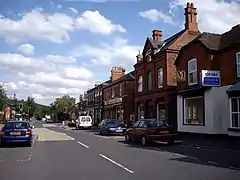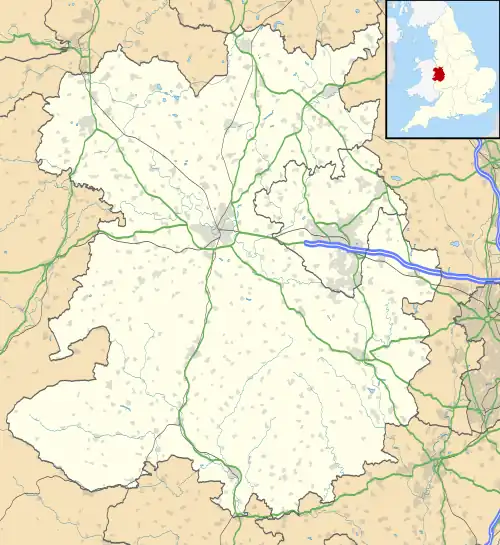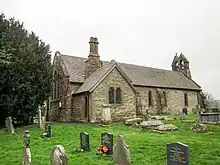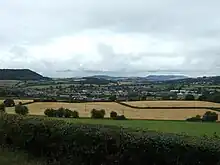Craven Arms
Craven Arms is a market town and civil parish in Shropshire, England, on the A49 road and the Welsh Marches railway line, which link it north and south to the larger towns of Shrewsbury and Ludlow respectively. The Heart of Wales railway line joins the Welsh Marches line at Craven Arms and the town is served by Craven Arms railway station. The town is enclosed to the north by the Shropshire Hills Area of Outstanding Natural Beauty, and to the south is the fortified manor house of Stokesay Castle.
| Craven Arms | |
|---|---|
 Corvedale Road | |
 Craven Arms Location within Shropshire | |
| Population | 2,289 |
| OS grid reference | SO432828 |
| Civil parish |
|
| Unitary authority | |
| Ceremonial county | |
| Region | |
| Country | England |
| Sovereign state | United Kingdom |
| Post town | CRAVEN ARMS |
| Postcode district | SY7 |
| Dialling code | 01588 |
| Police | West Mercia |
| Fire | Shropshire |
| Ambulance | West Midlands |
| UK Parliament | |
Craven Arms is a market town for the surrounding rural area, with a number of shops, estate agents, a supermarket, an abattoir and many commercial/light industrial businesses. It is also a visitor destination, being home or nearby to a number of attractions, and being central for visitors to the area of outstanding natural beauty. It describes itself as the "Gateway to the Marches".
History
Craven Arms is a relatively new town (for Shropshire), being only a small village called Newton on a map of 1695. The settlement grew when the railway station came during the mid to late 19th century, making it a railway town. Newton or Newtown is still the name for the southeastern part of the present day town, while the northern part is called Newington or New Inn (another small village which existed prior to the town). The town takes its name from the Craven Arms Hotel, which was situated on the junction of the A49 and B4368 roads, which in turn is named after the Lords Craven (who owned nearby Stokesay Castle).
The civil parish of Craven Arms was formed in 1987 by the merging of two older parishes — Stokesay and Halford. These two older entities continued as parish wards; however, a review of the governance of the parish in 2012 concluded that these two wards would be abolished from May 2013.[1] Small parts of the settlement overlap into neighbouring Wistanstow and Sibdon Carwood parishes.
Geography
Nearby towns are Bishop's Castle, Clun, Church Stretton and Ludlow, of which the last is the most substantial with 10,000 inhabitants.
The River Onny flows to the town's east and just over the river is the small village of Halford. To the south is the small village of Stokesay, while to the north is the village of Wistanstow.
Wenlock Edge is to the northeast of the town and runs in a northeasterly direction, towards Much Wenlock.
Attractions


There are three main visitor attractions in the Craven Arms civil parish. In the town there is the Shropshire Hills Discovery Centre, a centre featuring exhibits about the county's geography;[2] and Stella Mitchell's Land of Lost Content Museum, a collection of 20th-century memorabilia.[3] Stokesay Castle is a fortified manor house located within the parish, just south of the town.
Religious sites
.jpg.webp)
Craven Arms is home to several churches. The Anglican parish church is the grade II listed church of St Thomas, outside the town in the village of Halford.[4][5] The grade I listed Church of St John the Baptist, Stokesay is south of the town near Stokesay Castle.[6] St Andrews Community Church in the town centre is "non-denominational, evangelical & charismatic",[7] and there is a Methodist church,[8] and a Jehovah's Witnesses Kingdom Hall. A small Islamic centre is in the town on Newton Street.[9] It is the only mosque for the surrounding Shropshire Hills. The other nearest mosques are in Shrewsbury and Telford.
Recent development
The town has recently gone through a phase of expansion and this looks set to continue with the (2009 abolished) South Shropshire District Council stating that they wished to see the town become the district's second main market town (after Ludlow) by 2026. Much of the recent housing development is on the west side of the town, whilst commercial development is taking place more on the northern end. Development potential towards the east is restricted by the floodplain of the River Onny, whilst to the south lies the historically important Stokesay Castle.
The town centre itself has seen some notable developments in recent years, with new commercial buildings built on Dale Street by the A49 road. Additionally, to the immediate south of the town centre is the Shropshire Hills Discovery Centre which opened in 2001 and some new housing.
Notable people
- Brian Farley (1927 in Craven Arms – 1962) an English professional footballer who played for Chelmsford City and Tottenham Hotspur.
- Leonard Arthur Bethell, soldier and author, lived at The Warren, Clunton, Craven Arms from 1946 to his death in 1950.
Cultural links
- Bruce Chatwin wrote On the Black Hill whilst staying at Cwm Hall near the town.[10]
- The film Atonement was filmed in part at Stokesay Court, three miles south of Craven Arms.[11]
See also
References
- Shropshire Council Archived 19 January 2012 at the Wayback Machine Governance Review - Craven Arms
- "Welcome to the Shropshire Hills Discovery Centre". Shropshire Hills Discovery Centre. Grow Cook Learn. Retrieved 6 January 2022.
- "Unusual museums … way out days out". The Guardian. 12 August 2011. Retrieved 10 August 2021.
- Historic England. "Church of St Thomas (1269927)". National Heritage List for England. Retrieved 6 January 2022.
- "Craven Arms: Show results". A Church Near You. Retrieved 6 January 2022.
Halford: St Thomas ... This is the parish church
- Historic England. "Church of St John the Baptist (1269934)". National Heritage List for England. Retrieved 6 January 2022.
- "Home page". St Andrews Community Church. Retrieved 6 January 2022.
- "Craven Arms". Shropshire & Marches Methodist Circuit. Retrieved 6 January 2022.
- "Our Masjid". Craven Arms Islamic Centre. Retrieved 6 January 2022.
- "Writer's retreat on the black hill". The Daily Telegraph. London. 12 June 2004. Archived from the original on 12 September 2012. Retrieved 30 April 2010.
- Daily Telegraph (24 August 2007). "Joe Wright: a new movie master". The Daily Telegraph. London. Archived from the original on 14 October 2007. Retrieved 24 August 2007.
.jpg.webp)